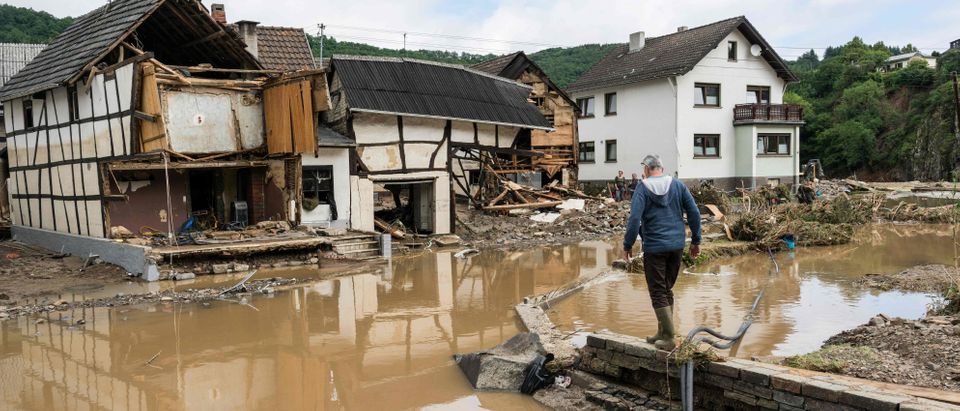At least 100 people were reported dead and hundreds more missing Friday in western Europe after heavy flooding produced by record rainfall swept away cars and collapsed houses in multiple cities.
A wave of storms that ensued earlier in the week in countries like Germany and Belgium have caused reservoirs and rivers to burst their banks, triggering flash floods in the region after the saturated soil couldn’t absorb any more water, The Associated Press (AP) reported. The death toll rose to more than 120 people across western Europe on Friday, and hundreds more are still unaccounted for, multiple outlets reported.
📹| Heavy flooding prompts chaos in Germany
▪️Heavy flooding turned streams and streets into raging torrents, sweeping away cars and causing some buildings to collapse.#Germany #Europe pic.twitter.com/WL1rKmFX53
— EHA News (@eha_news) July 15, 2021
Authorities in the North Rhine-Westphalia state in western Germany reported at least 30 people have died from the flooding, according to The AP. Another 28 people were reported dead in the Rhineland-Palatinate state after heavy rainfall caused the nearby Ahr river to burst its banks and bring down homes and buildings. (RELATED: New Yorkers Wade Through The Subway As Intense Storms Flood Parts Of The City)
Nine people have died and around 50 are missing after flooding in western Germany that caused several houses to collapse | Read more: https://t.co/7dIbdep6AL pic.twitter.com/iHf4NgJeYg
— RTÉ News (@rtenews) July 15, 2021
Andreas Friedrich, a spokesman for Germany’s national weather service Deutscher Wetterdienst, told CNN the country has “not seen this much rainfall in 100 years.” He added that “in some areas we’ve seen more than double the amount of rainfall which has caused flooding and unfortunately some building structures to collapse.”
“I grieve for those who have lost their lives in this disaster,” German Chancellor Angela Merkel said in remarks Thursday during a visit to Washington. “We still don’t know the number. But it will be many.”
Belgium, Luxembourg and the Netherlands were also affected by flash flooding overnight. At least eight people were reported dead in Belgium after the Vesdre River overflowed its banks and sent water through nearby towns, according to The AP.
Never seen this in Belgium #Verviers #flooding #floods pic.twitter.com/QC2PrHaPLB
— Hatice AVCI ‘Deniz’ (@HaticeDenizAVCI) July 15, 2021
“My thoughts are with the families of the victims of the devastating floods in Belgium, Germany, Luxembourg and the Netherlands and those who have lost their homes,” European Union Commission President Ursula von der Leyen tweeted Thursday.
EU Council president Charles Michel offered the organization’s support in a tweet Thursday, stating that the countries affected “can count on the EU’s help to face these dramatic floods.”
Armin Laschet, the Christian Democratic Union candidate expected to succeed Merkel as chancellor in September, attributed the flooding to climate change during a visit to an affected region, according to Reuters.
“We will be faced with such events over and over, and that means we need to speed up climate protection measures, on European, federal and global levels, because climate change isn’t confined to one state,” he said.
Stefan Rahmstorf, a researcher at the Potsdam Institute for Climate Impact Research, told The AP it was unclear whether the extreme weather was a direct result of climate change. He said atmospheric circulation might be causing long-term weather patterns such as heavy rains.


